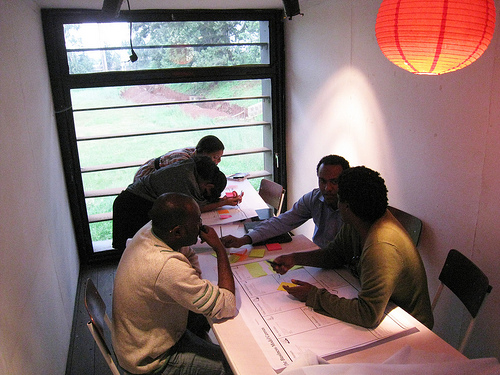
Twenty Ghanaian high-potential startups have concluded the first national bootcamp designed to promote local entrepreneurship and innovation in clean technologies. The initiative was organized last week by the soon-to-be-launched World Bank/infoDev’s Ghana Climate Innovation Center (GCIC). The bootcamp aimed to identify and launch growth-oriented Ghanaian entrepreneurs and new ventures involved in developing profitable and locally relevant solutions to climate change.
Several studies, including the World Bank’s report ‘Economics of Adaption to Climate Change’ and Ghana’s National Climate Change Policy Framework, have stressed how significant the impact of climate change will be on Ghana’s economy, people and development. Crop yields are predicted to decline by 7% by 2050 due to higher temperatures, while sea levels are expected to rise over one meter this century, causing the erosion of 1,120 square kilometers of land.
“Ghana is highly vulnerable to the impacts of climate change and as such, its prospects for continuous growth will depend on the country’s ability to build competitive and climate-resilient industries,” said Yusupha B. Crookes, World Bank Country Director. “In line with the National Climate Change Policy, by accelerating the development of local clean technology companies the Ghana Climate Innovation Center will help reduce the country’s vulnerability to climate change, while also creating jobs and promoting investments in new clean technologies.”
The twenty clean-tech companies in the bootcamp were competitively selected after a nation-wide campaign that led to almost 90 applications in a few weeks. Only the companies with the highest level of innovation, technical expertise, and potential for commercial success were invited to the bootcamp. The bootcamp consisted of an intense two-day training program designed to refine the entrepreneurs’ business concepts and a pitching contest held in front of a panel of local investors and industry experts.
The bootcamp participants represented some of the most promising clean technology sectors in Ghana’s green growth agenda, including solar energy, biofuels, waste and water management.
“With the support from our mentor and various experts, we asked ourselves questions that we had not previously thought about,” said Sylvia Akotia, one of the entrepreneurs who participated in the bootcamp and won one of the seven awards of the pitching competition. “Having an external perspective has helped us identify our niche, our unique proposition, and the challenges we need to address to move forward with our business.”
The bootcamp is the first of a series of activities that the Ghana Climate Innovation Center will implement to support the country’s National Climate Change Policy. After its official inauguration in mid-2015, the center will provide up to 200 local companies with business facilities and a targeted suite of services that includes early-stage financing, technology commercialization, business development and capacity building support.
Supported by the Danish International Development Cooperation Agency (DANIDA) and the Government of The Netherlands, the GCIC aims to assist more than 20,000 households to increase resiliency to climate change through improved access to potable water, availability of clean energy, and more sustainable agriculture techniques.
FRENCH VERSION
Plusieurs études, notamment de la Banque mondiale rapport « Économie d’adaptation au changement climatique » et Ghana deNational Climate Change Policy Framework, ont soulignél’importance l’impact du changement climatique sera surl’économie du Ghana, de personnes et de développement. Lesrendements des cultures devraient pour diminuer de 7 % d’ici 2050 en raison des températures plus élevées, tandis que lesniveaux de la mer devraient s’élever plus d’un mètre de ce siècle,provoquant l’érosion de 1 120 km2 de terres.
« Le Ghana est hautement vulnérable aux impacts duchangement climatique et à ce titre, ses perspectives decroissance continue dépendra de la capacité du pays à bâtir desindustries concurrentielles et résilience climatique, » a déclaré ledirecteur de pays Yusupha Crookes B., Banque mondiale.“Conformément à la nationale changer la politique climatique, enaccélérant le développement des technologies propres locaux,entreprises, que le centre d’Innovation de climat Ghana aidera àréduire la vulnérabilité du pays au climat changer, tout en créantdes emplois et promouvoir les investissements dans nouvellestechnologies propres.”
Les vingt sociétés de technologies propres dans le camp d’entraînement ont été compétitifs sélectionnées après unecampagne nationale qui a mené à presque 90 demandes dansquelques semaines. Seules les compagnies avec le plus hautniveau d’innovation, expertise technique et potentiel de succèscommercial ont été invités au bootcamp. Le bootcamp se composait d’un programme d’entraînement intensif de deux jours visant à affiner les concepts d’affaires entrepreneurs et unconcours de tangage qui s’est tenue devant un grouped’investisseurs locaux et des experts de l’industrie.
Les participants de bootcamp représentant certains des secteursplus prometteurs de technologies propres dans l’ordre du jourdu Ghana croissance verte, y compris la gestion de l’énergie, lesbiocarburants, les déchets et eau solaire.
« Avec le soutien de notre mentor et divers experts, nousdemandions questions auxquelles nous n’avions pas penséauparavant, » a déclaré Sylvia Akotia, un des entrepreneurs quiont participé dans le camp d’entraînement et a remporté un dessept prix du concours tangage. « Ayant une perspective externenous a aidés identifier les défis que nous devons résoudre à allerde l’avant avec notre entreprise, notre proposition unique etnotre créneau. »
Le bootcamp est le premier d’une série d’activités que le centred’Innovation de climat Ghana mettra en œuvre pour soutenir lapolitique de changement climatique nationale du pays. Après soninauguration officielle en mi-2015, le centre offrira jusqu’à 200entreprises locales avec des équipements d’affaires et unegamme ciblée de services qui inclut le financement précoce, lacommercialisation de la technologie, la prospection et l’appui aurenforcement des capacités.
Pris en charge par l’Agence danoise de la coopération pour ledéveloppement International (DANIDA) et le gouvernement despays-bas, le GCIC a pour but d’aider plus de 20 000 ménages àaccroître la résilience au changement climatique en améliorantl’accès à l’eau potable, la disponibilité d’énergie propre et destechniques d’agriculture durable plus.


